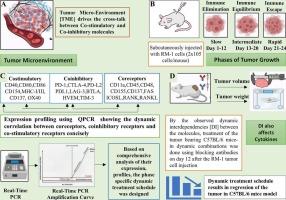合理组合靶向免疫共受体导致肿瘤消退。
IF 3.7
3区 医学
Q2 BIOCHEMISTRY & MOLECULAR BIOLOGY
引用次数: 0
摘要
不同的共刺激和共抑制分子影响免疫反应的动态。由于它们的表达水平可能共同决定抗肿瘤免疫反应的幅度和质量,我们提出这些分子的表达在肿瘤的进行性生长过程中是动态调节的,对它们表达水平的研究将指导确定抗肿瘤免疫治疗的组合靶点。根据rm -1诱导的C57BL/6小鼠进展性前列腺肿瘤模型中33种免疫分子在肿瘤内和淋巴结内的表达动力学,设计了一种三相联合抗肿瘤免疫疗法。联合抗共抑制性受体的阻断抗体和抗刺激受体的激动抗体进行阶段特异性治疗,肿瘤消退显著,细胞因子表达显著,提示有针对性的个性化抗肿瘤免疫治疗可提高治疗效果,降低毒性和治疗失败风险。本文章由计算机程序翻译,如有差异,请以英文原文为准。

Rationalized combinatorial targeting of immune co-receptors leads to tumor regression
Different co-stimulatory and co-inhibitory molecules influence the dynamicity of an immune response. As their expression levels may collectively decide the amplitude and quality of an anti-tumor immune response, we proposed that the expression of these molecules would be dynamically modulated during a progressive tumor growth and that the study of their expression levels would guide fixing a combinatorial target for anti-tumor immunotherapy. Based on the kinetics of expression of 33 immune molecules within the tumor and draining lymph nodes during RM-1-induced progressive prostate tumor model in C57BL/6 mice, a three-phase combinatorial anti-tumor immunotherapy was designed. Phase- specific treatments with combinations of blocking antibodies against co-inhibitory receptors and agonistic antibodies against stimulatory receptors resulted in significant tumor regression and cytokines' expression, suggesting a strategic personalized anti-tumor immunotherapy with enhanced therapeutic efficacy, reduced toxicity and the risk of treatment failures.
求助全文
通过发布文献求助,成功后即可免费获取论文全文。
去求助
来源期刊

Cytokine
医学-免疫学
CiteScore
7.60
自引率
2.60%
发文量
262
审稿时长
48 days
期刊介绍:
The journal Cytokine has an open access mirror journal Cytokine: X, sharing the same aims and scope, editorial team, submission system and rigorous peer review.
* Devoted exclusively to the study of the molecular biology, genetics, biochemistry, immunology, genome-wide association studies, pathobiology, diagnostic and clinical applications of all known interleukins, hematopoietic factors, growth factors, cytotoxins, interferons, new cytokines, and chemokines, Cytokine provides comprehensive coverage of cytokines and their mechanisms of actions, 12 times a year by publishing original high quality refereed scientific papers from prominent investigators in both the academic and industrial sectors.
We will publish 3 major types of manuscripts:
1) Original manuscripts describing research results.
2) Basic and clinical reviews describing cytokine actions and regulation.
3) Short commentaries/perspectives on recently published aspects of cytokines, pathogenesis and clinical results.
 求助内容:
求助内容: 应助结果提醒方式:
应助结果提醒方式:


